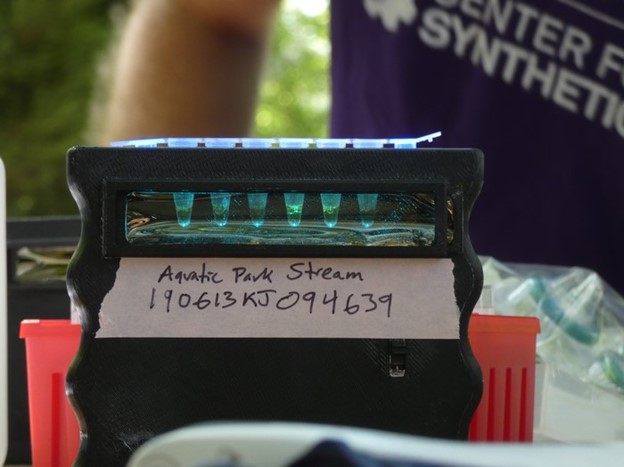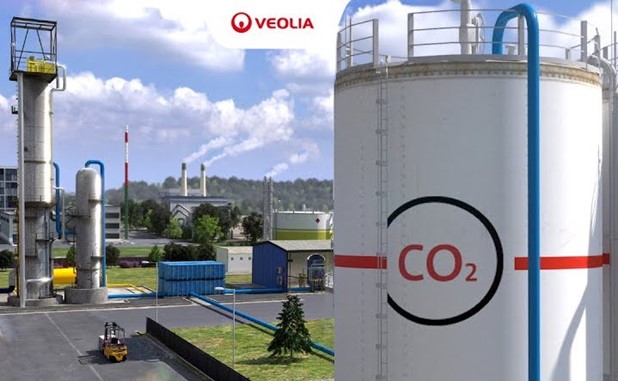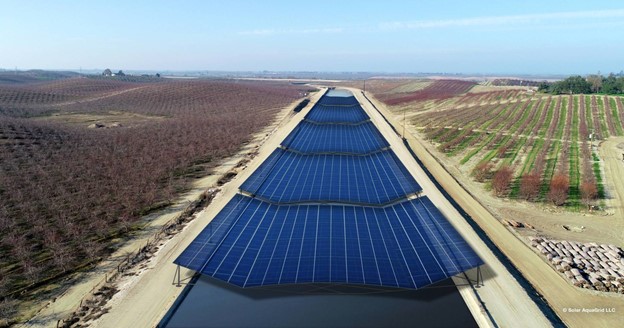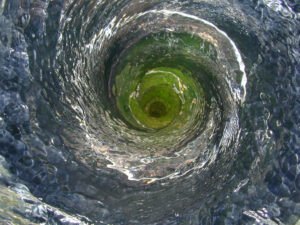Water Tech Spotlight: the latest technology developments in the water industry | April 2022
Tech solutions and innovations are the mainstays towards a water-wise world. Water Tech Spotlight is a monthly blog that aims to highlight worldwide the latest technology developments in the water industry. Scroll down to find out more.
1. NEW DNA COMPUTER ASSESSES WATER QUALITY

Testing water from an area affected by wildfires in California. Image courtesy of Northwestern University
A low-cost, easy-to-use, hand-held device that can determine if the water is safe to drink within minutes has been recently developed at Northwestern University. Using powerful and programmable genetic networks, this new device is able to mimic electronic circuits and thereby perform a range of logic functions, for example, processing an analog input (contaminants) and generating a digital output (a visual signal to inform the user). The research was published in the journal Nature Chemical Biology. Read more…
2. PRODUCING GREEN AVIATION FUEL BY CAPTURING CO2 FROM MUNICIPAL WASTE

Green fuel: the conversion of CO2 from municipal waste. Image courtesy of Veolia
An interdisciplinary consortium of LIPOR (Intermunicipal Waste Management of Greater Porto), P2X Europe and Veolia is launching feasibility studies at the Maia Energy Recovery Plant to produce green synthetic eFuel made of CO2 from municipal waste. Up to 100,000 tons of biogenic CO2 can be captured and recycled for conversion into eFuels in its first phase. This innovative technology will facilitate the conversion of waste into resourses and reduction of GHG emission. Read more…
3. NEW SOLAR CANALS TO BE INSTALLED IN CALIFORNIA

Conceptual rendering of spanning the 110 foot-wide TID Main Canal. Image courtesy of Solar Aquagrid LLC
Covering water bodies with solar panels can provide multiple benefits. Project Nexus is a pilot project that responds to the challenges of the energy, water and food nexus in the State of California. The deployment of solar PV panels over water canals reduces the evaporation of water and contributes to the generation of renewable electricity. A win-win game for water, energy and climate! Read more…
Atmospheric water harvesting (AWH) is one of the promising solutions for freshwater production. A team of researchers from the University of Texas, Austin, have developed a novel “salt-friendly” polyzwitterionic hydrogel that can efficiently harvest large amounts of freshwater from dry air. The study, published in the journal Angewandte Chemie, shows that the basis for the new hydrogel was a polymer constructed from zwitterionic molecules. Hygroscopic salt combined with hydrogel can capture moisture and enhance swelling, leading to enhanced moisture uptake capacity. Read more…
5. NATURE-INSPIRED REVERSE HURRICANE
Vortexing works by sending water around in a hyperbolic funnel shape. Cover image courtesy of I. Schauberger
Aeration is one of the most energy-intensive processes in water and wastewater treatment and can be costly. To improve the aeration efficiency and cost-effectiveness, researchers from Wetsus have discovered a method of dissolving oxygen into water using a nature-inspired vortex, or whirlpool, that is five times more rapid and much cheaper than the conventional oxygen distribution process using bubble diffusers. The patented method published in the journal Water shows that geometrically constrained vortices in a hyperbolic funnel are a promising aeration technique. Read more…
Disclaimer
The International Water Association (IWA) is not liable for any damages arising in contract, tort or otherwise from the use of or inability to use WaterTech Spotlight or any material contained in it, or from any action or decision taken as a result of using it. The contents of WaterTech Spotlight do not comprise the IWA’s views; they do not constitute legal or other professional advice. You should consult your professional adviser for legal or other advice. IWA is not responsible for the content of any linked site or any link in a linked site. IWA is not responsible for any transmission received from any linked site. The links are provided to assist readers and the inclusion of a link does not imply that IWA endorses or has approved the linked site.
Contact: Sophie.Su@iwahq.org


